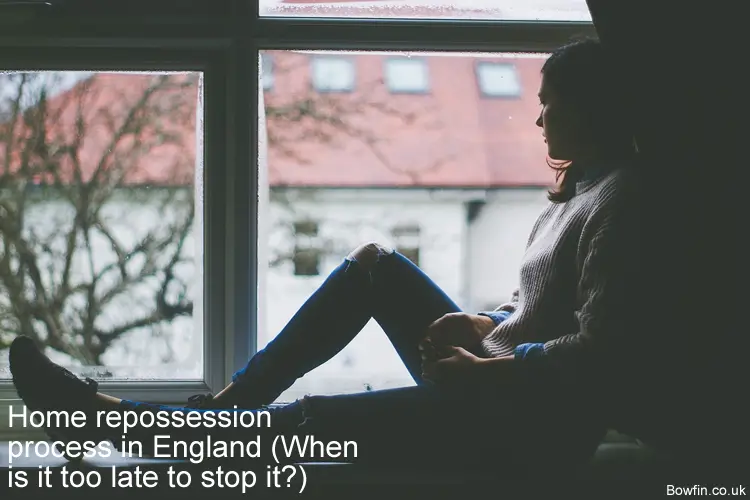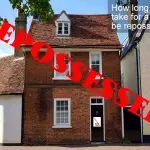
The home repossession process explained and how to stop it at each stage in the process
At any one time there up to 100,000 families across the UK who risk losing their home due to missed mortgage payments. By missing a mortgage payment, you fall into arrears and this is what starts the home repossession process in the UK.
Home repossession process in the UK. If you can’t agree a payment plan, your mortgage lender may start court action to begin the repossession process to repossess your home. But mortgage lenders only commence court action as a last resort and only after you’ve missed three payments. Your lender must follow certain rules before starting court action.
You need to understand that your mortgage is secured against your home and your lender has the right to repossess it. But if you speak to your lender and explain your predicament, you may be able to stop the repossession and agree revised payment terms.
But up to what stage in the repossession process can it be stopped to avoid being repossessed? Let’s try to answer this question by going through each of the steps in the home repossession process in the UK.
The home repossession process in the UK
- Your mortgage lender will write to you about your mortgage arrears. This is triggered when you fall into arrears by missing a payment on your mortgage.
- Your mortgage lender will apply to the court to request a possession order.
- The court will write to you giving notice of the repossession hearing date.
- The repossession will be heard by a judge.
- The court makes an order for repossession.
- If you don’t leave by the prescribed date and time, bailiffs will be sent to remove you.
- Your mortgage lender will sell your home.
- Your mortgage lender may seek the balance of any outstanding mortgage from you. Or your lender will send you the balance of any equity that is left.
Now that I’ve set down the home repossession process, let’stake a look at each step in a bit more detail.
More Reading: How long does a missed mortgage payment stay on your credit in the UK
Step by step of the home repossession process in the UK

1. Your mortgage lender will write to you about your mortgage arrears
When you fall behind on your mortgage by missing mortgage payments, this is what’s known as mortgage arrears. It only takes one month’s missed payment to fall into arrears.
Your mortgage lender is obliged to follow a set of rules on how they deal with your mortgage arrears. Their first obligation is to contact you and ask you to sort the problem out. This first contact is normally by way of a default letter which will be sent you your house.
If you don’t respond to this initial letter, your mortgage lender will write you a second time. They must warn you that they’ll start court action to repossess your home if you don’t respond.
Or if you’ve made contact with them with a proposal and they don’t agree with your response, they should write to confirm this.
Can your home repossession be stopped at this stage in the process?
You are best advised to not ignore your mortgage lender if they’ve contacted you about being behind on your mortgage payments.
Ignore them at your peril!
If you choose to ignore your lender about your mortgage arrears, this will only serve to speed the repossession process up.
Take time to consider your options and your situation. Work out what sort of a deal you could put to your lender to resolve your mortgage arrears and to get back on track paying your mortgage payments once more.
At this stage in your home repossession process you have the best opportunity to stop your repossession.
You can negotiate with your lender and discuss ways to make changes to your mortgage terms. For example:
- Ask to take a mortgage repayment holiday.
- Perhaps ask to extend your mortgage term.
- Request a mortgage with lower monthly repayments.
- Ask to see if your mortgage lender will capitalise the arrears, which means they’ll add them to the mortgage balance.
If your current mortgage lender won’t play ball, you may want to consider switching to another mortgage lender.
Having said that, your credit report will already be ‘damaged‘ because of the mortgage arrears. This may make it more difficult to borrow from another lender.
The important message in this article is to make sure you communicate with your mortgage lender. Try your hardest to negotiate with them and look to find a solution to your mortgage arrears problem.
2. Your mortgage lender will apply to the court to request a possession order.
If you either fail to respond to your mortgage lender by ignoring them. Or if you are unsuccessful in negotiating better terms to resolve your mortgage arrears situation, your lender will apply to the court for a possession order.
Your mortgage lender must apply to the court. In doing so they must set out their reasons why a judge should give them possession of your home and grant the possession order.
You can seek help and advice from your local Citizens Advice office, the National Debtline, Shelter or from your local council.
Can the home repossession process be stopped at this stage in the process?
Yes it can be stopped at this stage. Don’t give up on stopping your home from being repossessed.
For example, if you have so far ignored the letters from your lender, it’s not too late to respond.
Continue to correspond with your lender. This will stand you in good stead when in front of the judge. But if you go to court and you’ve completely ignored your lender, this would go against you.
3. The court will write to you giving notice of the repossession hearing date
When the court receive your lenders application, the court will fix a date for the court hearing. It will be at this hearing where a judge will decide if you can keep your home or not.
The time it takes for your local county court to list the hearing will depend on how busy the court is. Courts are extremely under funded at the moment like all government departments. But don’t rely on this delay, as the stop clock is ticking.
You should receive a copy of your lenders claim form from the court. This will include the following information:
- The date and time of the court hearing together with details on where your court is located.
- The claim will set out the reasons why your lender wants to repossess your home.
- This court notification will include a defence form for you to complete and return to the court.
Can the home repossession process be stopped at this stage in the process?
As with each stage in the home repossession process you are still able to stop the process. With this in mind, it’s extremely important that you complete the defence form and return it to the court in good time.
You’d be advised to seek advice on this as soon as you can. Seek help in completing the defence form and on how to best prepare for the hearing.
Make it clear in your response to the court about your negotiations so far. But also, if you have any other solutions to stop the repossession, it would be good to include these too.
4. The repossession will be heard by a judge
At the hearing in the county court the judge on the day will make a decision about your house repossession. During the course of the hearing, but usually beforehand too, the judge will read the evidence from both sides.
This is why it’s important that you respond to the the court and submit your defence form.
The judge will likely ask questions of both sides and will also be looking to make sure your mortgage lender has followed correct procedures.
Once the judge has heard and read the evidence, they will make their decision about the repossession.
The possible outcomes of the judge’s decision are as follows:
- Rule that your home should be repossessed. If this is the decision, you’ll be given between 28-56 days to move out of your house. Which means that if you don’t move out in the prescribed time, you can be evicted by bailiffs.
- The judge may rule for a suspended possession order. Where you receive a suspended possession order, you are allowed to stay in your home, provided you keep to certain conditions that the judge will have set.
- The case may be adjourned. During the judge’s reading and hearing of the evidence, they may require certain other information. This may be either from the lender or from you. Between the postponement and the next hearing date, either you and/or the lender may be required to carry out certain steps before the case comes back to court.
- Your case may be dismissed by the judge altogether. If this is the case your home cannot be repossessed by your mortgage lender at this time.
Can the home repossession process be stopped at this stage in the process?
Even at this stage there is a chance that you could stop the repossession. If the outcome is number four above, then of course the repossession process stops.
But with each of the other outcomes from the court hearing, what can be done to stop the repossession, depends on how much time you’re given and whether you or your lender is required to provide more evidence.
However, it is still possible to stop a repossession even if the judge has ruled for a possession order.
But you need to act quickly to stop it.
5. The court makes an order for repossession
One of the outcomes from the court hearing is that the judge makes an order for repossession. You have to assume when you go to court that this is going to be the outcome. That way you are prepared for the worst. Of course if the judge rules otherwise, this will be a bonus.
However, as already mentioned above, from the time the decision is made in court for the possession order, you will normally have between is 28-56 days to leave your home.
At the end of the hearing the judge will also decide on costs. In the scenario where they have granted a possession order, they will usually make an order that you pay the lender’s costs. These costs will be added to what you already owe to your lender.
Is it too late to stop the home repossession process at this stage in the process?
No, even at this late stage it’s still not too late to stop the repossession. But you have to be aware that time is not on your side. Assuming you’ve been given 28 days to leave your home, that’s not a lot of time to work on a solution.
To stop the repossession, you need to act fast and you need to act now.
However, the judge may have granted a suspended possession order. If this is the case, you will be allowed to stay in in your home. But in order to do so, you will have to stick to what has been set out in the suspended possession order.
For example, the order may include that you must continue to pay your normal monthly mortgage instalments, together with an amount towards your mortgage arrears.
6. If you don’t leave by the prescribed time, bailiffs will be sent to remove you
If the time given by the courts expires and you don’t leave, your mortgage lender will engage the services of a bailiff. The bailiff will be sent to your home to evict you and if you refuse, they will involve the police.
Similarly if you don’t stick to your payment plan agreed in court, your lender can instruct bailiffs to evict you in the same way.
In both cases your lender will have to apply to the courts for a bailiffs warrant.
When the bailiffs arrive they are not allowed to use physical violence or offensive language towards you. But if you don’t leave your home voluntarily, the bailiffs will normally call the police for help.
7. Your mortgage lender will sell your home
Once your home has been repossessed, your lender will sell your house. They usually sell repossessed homes at below market value. Usually at around a 25% discount. This is bad news for you, as this reduces the proceeds the bank receives to satisfy your outstanding mortgage.
The sale at below market value lessens the chances of your getting any money back after the repossession.
Until such time as your property is sold by your lender, you are still responsible for paying the interest that is continuing to accrue on the loan.
8. Your mortgage lender may seek the balance of any outstanding mortgage from you
If there ends up being a shortfall after your home is sold, you may have to pay this off to the lender.
But where there are surplus funds after the mortgage is paid and any fees for the courts and bailiffs are deducted, this balance will be paid to you.
Don’t stick your head in the sand
I hope this article has helped you if you’re behind on your mortgage payments. Or perhaps you may already be part way down the repossession process.
If you are and you need to talk to a friendly voice, we are here to help. We have some creative solutions that may resolve your predicament.
If you need help, please go to our contact us page and leave us a message.
I hope you’ve got something from reading this article on home repossession process in England
If you’ve got something from this article on home repossession process in England please share it on your favourite social media site.
Also, if you have any questions, please feel free to comment below too. Alternatively, if you need more help, please feel free to contact us on our contact us page here. Or join the discussion and ask your question in the property forum.




